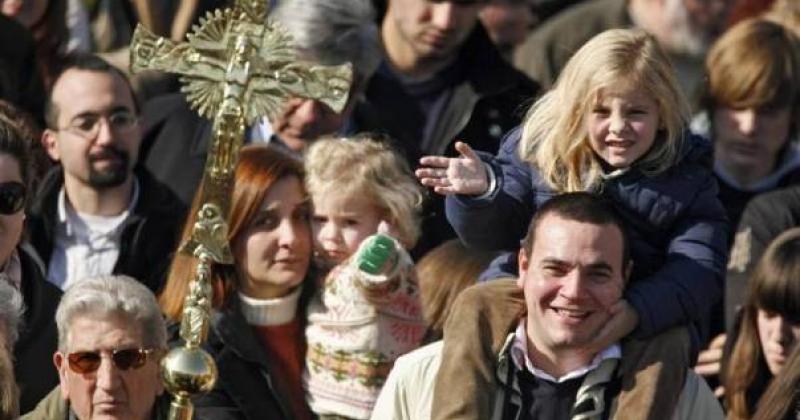At today’s General Audience, on Wednesday, August 19, 2015, Pope Francis stressed that the responsibility of managing work cannot be left in the hands of the few or dumped on a deified market”.
The tendency “to consider the family a hindrance, a burden, a liability for work productivity” is “dangerous”. At today’s General Audience, Pope Francis spoke out against the risk of work keeping families “hostage” or acting as an obstacle to it because if it does then “we may rest assured that human society will begin to work against itself”. The responsibility of managing work cannot be left in the hands of the few or dumped on a deified market”.
The Pope, who dedicated last week’s catechesis to “celebrations”, focused on “work” at today’s Audience. “Both form part of God’s plan for creation, celebration and work,” he said. “The nicest thing you can say about a serious and honest person is: ‘He/she is a worker’, a person in the community who does not live off other people. As I see many Argentinians in the crowd, I will tell you what we say in Argentina: ‘no vive de arriba’ (someone who does not scrounge off other people, Ed.), you understand? Indeed, work, in all its many forms, starting with the work done in the home, should also take into account the common good. And where do we learn about this industrious lifestyle? The first place we learn about it is in the family. The family educates us about work through the examples set by our parents: mum and dad, who work for the good of the family and society.” Francis mentioned the Gospel passage where Jesus is referred to as “the carpenter’s son”, or he himself is called “the carpenter”. The Pope also quoted a phrase used by St. Paul in his Letter to the Thessalonians: “If any man will not work, neither let him eat’ (“it’s a great way to lose weight”, the Pope joked). “According to the Christian conception, commitment to work and spiritual life do not conflict with one another. It is important to get that straight! There can and must be harmony between prayer and work, as St. Benedict taught. The lack of work harms the spirit amongst other things,
“Work – I repeat, in all is many forms –, is innate to human beings. It expresses the dignity they feel of being created in God’s image. For this reason we say work is sacred. And this is also why the management of work is a great human and social responsibility which cannot be left in the hands of a few or dumped on a deified “market”. Causing the loss of jobs means causing serious harm to society. I am saddened, the Pope continued, when I see that there is no work, that there are people without jobs, people who cannot find work and do not have the dignity to put bread on the table. It pleases me a great deal to see leaders making great efforts to find jobs and attempt to ensure that everyone has a job. Work is sacred, work gives a family dignity. We must pray for families not to lack work”.
The Pope then quoted his “Laudato Si’” encyclical, to emphasise that “the beauty of the earth and the dignity of work are meant to go hand in hand. When work becomes detached from God’s alliance with man and woman, when it is separated from their spiritual qualities, when it is kept hostage by the logic of pure profit, disregarding life’s feelings, the humiliation of the soul contaminates everything: air, water, grass, food… Civil life becomes corrupted and the habitat is damaged. It is the poor and poor families that suffer the consequences the most. Today’s work system sometimes shows a dangerous tendency to consider the family as a hindrance, a burden and a liability for work productivity.
But the question we should ask ourselves is: which productivity? For whom? The so-called ‘intelligent city’ is undoubtedly rich in terms of services and organisation. But, it is often hostile to children and the elderly for example. Sometimes, planners are interested in managing individual manpower which is to be assembled and used or discarded on the basis of economic convenience. Families are big testing grounds. When work keeps a family hostage or hinders its path we may rest assured that human society will begin to work against itself!” “God has given Christian families the challenge and mission to make present the foundations of his creation: a true understanding of the identity of man and woman and the bond they share, their call to bring children into the world, and the gift of work in making the world ever more fruitful and hospitable,” his catechesis continued. Pope Francis concluded with a prayer: “May God help us to embrace this call in joy and hope, especially amidst the many challenges we face today.”
At the General Audience, Francis mentioned - amongst others - the Taizé community, which is celebrating the 75th anniversary of its foundation and the 10th anniversary of the death of the community’s founder, Brother Roger its founder.
